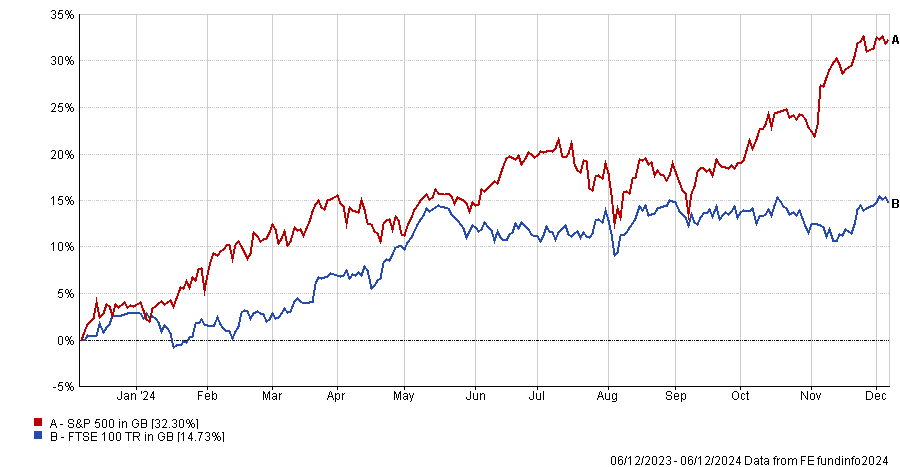It would have been easy to get swept up in the ‘doom and gloom’ over UK equities this year.
While recent reports from Calastone found that UK equity funds experienced their first month of net inflows in over three years in November, that was a drop in the ocean compared to the £25.3bn which was withdrawn from UK equity funds in the past three and half years.
For Sue Noffke, manager of the £222m Schroder Income Growth fund and head of UK equities, “the challenge that feels most acute today is if the UK equity market even deserves to exist”.
The case against the UK
Certainly, the UK has underperformed against the S&P 500 over the past 12 months, with the FTSE 100 returning just 14.7% compared to its North American counterpart, which surged by 32.3% in the same period.
Performance of global market indexes over the past 12 months

Source: FE Analytics
Noffke thinks the strong performance of the US stock market has been partly driven by FOMO (the fear of missing out) amongst investors, who began to believe that US equities were the only game in town worth pursuing.
As a result, many companies have begun to wonder if they should continue to list in the UK. Ashtead, which hires out construction equipment, is planning to move its listing from London to New York, following in the footsteps of Paddy Power owner Flutter and building materials group CRH. Shell considered doing likewise but decided against it.
Consequently, for Noffke, one of the biggest challenges facing the UK market is the sentiment towards it.
Ken Wotton, lead manager of the £223m WS Gresham House UK Smaller Companies fund, added that UK fund managers are constantly fighting against this negative narrative.
Following 41 months of outflows from UK equity funds, selling pressure and underperformance, the market has struggled to value companies effectively, leading to widespread underestimation of UK stocks, he argued.
Wotton agreed with Noffke that investors have been moving out of the UK, into the US and he thinks global benchmarks and the rise of passive investing are partly to blame. “There is a self-fulfilling property to benchmarking behaviour. The US equity market does better, so index funds must buy more of it, and the people who benchmark global indexes must buy more of it as well,” he added.
Is the UK market better than investors think?
However, for both Noffke and Wotton, this ‘doom and gloom’ has been overemphasised.
The initial price that investors pay is a crucial determiner of future returns, Noffke argued. Following years of underperformance, many UK stocks are now cheaper than ever, despite having fundamentally strong business models that can "breathe the same air" as the S&P 500 in the long term.
“Looking in the rear-view mirror at what has done well is not the best predictor of future returns,” she added.
Moreover, UK stocks represent great diversifying additions to a portfolio, Noffke said. The UK is an international market, with almost 55% and 78% of FTSE 250 and FTSE 100 companies’ revenue coming from international sources, making them great plays on global trends.
She said: “We need people to wake up and see that things are going at bargain prices. If you are not there [in the UK market], you are missing out.”
Wotton came to a similar conclusion. “I think the relative value argument will eventually win. Why would you put money into the US at an all-time high when you could put it into the UK at half the price?”
Wotton identified XPS Pensions as an attractive UK-listed opportunity that combines significant runway for growth with solid fundamentals and cash flow, all at around 10x enterprise value (EV).
XPS Pensions stock price performance YTD

Source: Google Finance
He said: “If you look at the financial profile of this business, bagged it differently, and listed it in the US, you would get a much higher valuation.”
Additionally, Wotton said that international private investors are increasingly acknowledging the opportunity set in the UK, demonstrated by M&A deals worth almost £5.3bn in the final week of November alone. This indicates that the UK market is far more attractive than many admit, he said.
“I think we’re very good at being self-deprecating. The immediate narrative would have you believe that the economy and political system are broken, and that is not the case. Is the UK capital market dead and buried? No, I don’t think so,” Wotton concluded.





